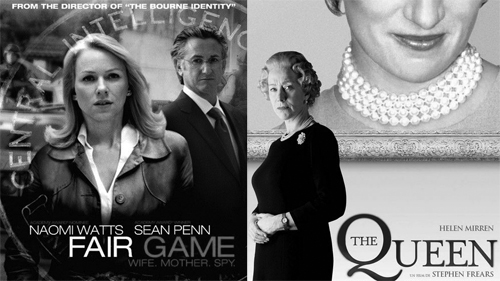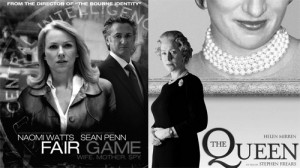Movies that take on recent historical events with a revisionist twist have become more and more common these days. Perhaps the best example of this approach is “The Queen,” which netted Helen Mirren the Oscar in 2006. Such films tend to take real world events and make an educated guess as to what might have happened behind closed doors within the larger context of what we know did happen. Just the fact that “Fair Game” has been promoted and plays like a modern Hollywood political thriller made me question whether the events depicted within the film are meant to be historically accurate.
Sure, the script is taken from two books written by the movie’s subjects, Valerie Plame and Joseph Wilson. And there is certainly truth that Plame’s outing as a CIA agent had some relationship to her husband’s campaign against the Bush Administration’s use of intelligence leading up to the Iraq War. But the pacing and filmmaking approach adopted here could be argued to cheapen the real story lurking underneath. And given the promotion of the film as a thriller, it is easy to take pot shots at the possible dumbing down of serious history.
As a thriller, “Fair Game” works fairly well. Much of the tension that is exuded from every corner of this movie is greatly lessened, however, without having some basic understanding of what happened to Plame and Wilson in real life. Naomi Watts plays Plame solidly with a coldness that sells the CIA agent persona. And Sean Penn, whose off-screen political positions cannot be ignored here, makes us dislike Joseph Wilson almost as much as we dislike those that may have manipulated intelligence wrongly to win support for the Iraq War. Penn plays Wilson as always the smartest man in the room and Watts’ Plame is a little more aloof holding back because she lives two lives. Wilson is depicted as impulsive and reckless but still the victim, which may enrage some people who see the events in a different light.
No mention is made of allegations concerning whether Wilson himself had let slip his wife’s secret nor is any effort made to present an opposing view of the entire sorry affair. Because this is not meant as some kind of objective documentary, the writers were free to take certain calculated liberties. This possibly somewhat fictionalized perspective is exclusively from the Plame/Wilson camp and little things bothered me. For example, when Plame chose to leave the CIA in the film, she is shown as being completely alone. I have no way of knowing this, but I would think that a visit to her lawyer occurred at some point and she and Wilson may have had some help from PR professionals. While this may have happened much later, Plame and Wilson did sign lucrative book contracts that resulted in this Hollywood version of their ordeal. I just thought that something was missing from the unraveling experience displayed on screen.
It is important that even though the source material is from the subjects themselves, there are scenes in the film that allegedly happened outside the presence of Plame or Wilson. And this is where liberties may have been taken with the facts. “Fair Game” shouldn’t be taken as a history lesson, but as a thinking man’s thriller.



